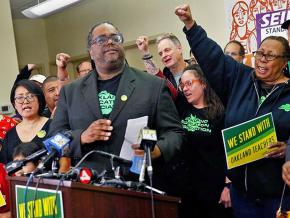Oakland schools are on the line
reports from Oakland as the showdown between teachers and a school district bent on privatizing comes to a head—on the picket line.
MEMBERS OF the Oakland Education Association (OEA) members are walking out today after an impasse in bargaining with the Oakland Unified School District (OUSD) and working without a contract for almost two years.
Teachers voted by an overwhelming majority to authorize a strike earlier this month. A few days later, more than 2,000 students staged a sickout to show their support for teachers’ and their demands. About 200 Oakland Tech students organized a march down Broadway to the offices of the OUSD.
Teachers didn’t wait around for strike authorization. They organized two wildcat strikes — the first in December at Oakland High School and the second in January at five high schools and one middle school.
Educators aren’t alone in their frustration over school closures — the district is threatening to shut down as many as 24 schools — lack of funding for services that students need, and the privatization and charterization of Oakland schools.

Over the last two months, teachers, parents, students and community members have been anticipating a possible strike while waiting for recommendations from a neutral fact-finding report as part of the settlement process with OUSD.
A coalition of organizations supporting the OEA have come together under the banner of Bread for Ed, making plans to feed the more than 30,000 students and striking teachers during the strike. The City has donated recreation centers, and churches will open their doors as strike solidarity schools.
Parents and students can regularly check for updated information for food distribution and location of strike solidarity schools.
THE TEACHERS’ demands include more services for students, including nurses, social workers and psychologists; a stop to school closures and the co-location of charter schools in public facilities; an end to the teacher retention crisis, and a 12 percent raise over three years to stop falling behind the Bay Area’s high standard of living.
In a February 18 statement, OEA President Keith Brown said:
Oakland teachers and parents are united that OUSD must reinvest in our schools, including paying teachers a living wage to keep them in Oakland, reducing class sizes for better learning, providing badly needed nurses, school psychologists and counselors, and ending plans to close up to 24 public schools. Instead of being dishonest with our community, OUSD should focus on improving our schools.
The Alameda County Labor Council and member unions will honor picket lines and support OEA at daily pickets and rallies. The historic Grand Lake Theater will host special shows, including the film Black Panther, on the first day of the strike, at a cost of $1 admission and $1 for popcorn. The Oakland Museum of California will provide free admission to students during the strike.
A neutral fact-finder’s report issued February 15 upheld the OEA’s bargaining positions and sided with the union on the battle for state funds, the impact of charter schools inequality in state funding and local mishandling of funds. The report stated:
Public education is a right and a quality public education is essential to an ethical society that values the dignity and uniqueness of each child...California’s current educational funding system is complicated and flawed in a number of ways. These flaws make finding resolutions to this contract and other teacher contracts throughout the state very difficult.
California ranks in the bottom 25 percent of states nationally in per-pupil funding, and allocation of funding is based on attendance as opposed to enrollment, which typically affects urban schools the most.
The fact-finder’s report also acknowledged that state funding has dropped dramatically during and after the Great Recession and has only just returned to pre-recession funding levels — which means there is no adjustment for the effects of charter schools and or the cost of living for teachers and certified staff.
OAKLAND AND California aren’t alone in these manufactured crises. State-by-state measures to address inequity have been targeted by the charter school movement to funnel public funds into private hands.
For example, since California charter schools receive public funds the same way that public schools do — through attendance — they have no incentive to maintain enrollment based on serving students’ individual needs.
Unregulated charter schools can set up a revolving door for students to maintain high attendance rates — and thus the flow of public funds — without any accountability to the families and communities they claim to serve.
Our ongoing solidarity and organizing efforts should include further examination of the “complicated and flawed” funding questions, from Oakland to Sacramento to Betsy DeVos and the Department of Education. This has been a decades-long battle in which teachers and students were blamed for the conditions of our schools — instead of those who stand to earn a healthy profit in the privatization of our public schools.
Today, Oakland teachers, students and parents are charting a new way forward by walking the picket line. They deserve our support in their fight for the schools that Oakland students deserve.


